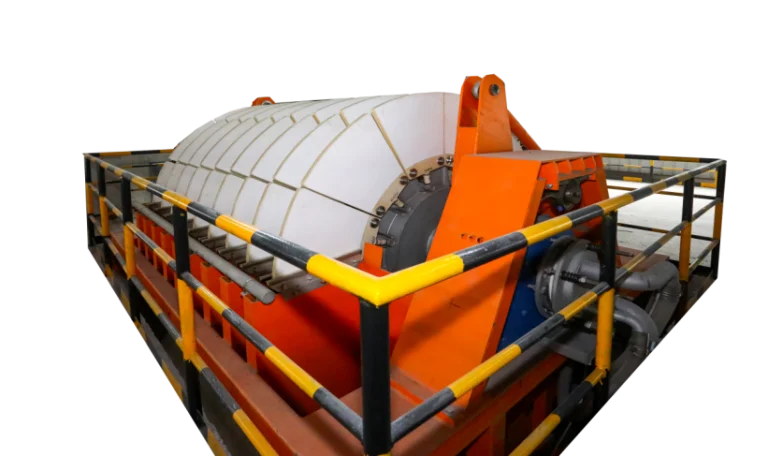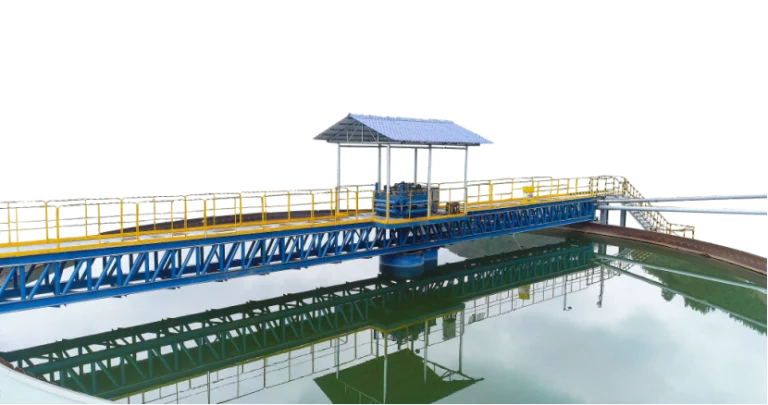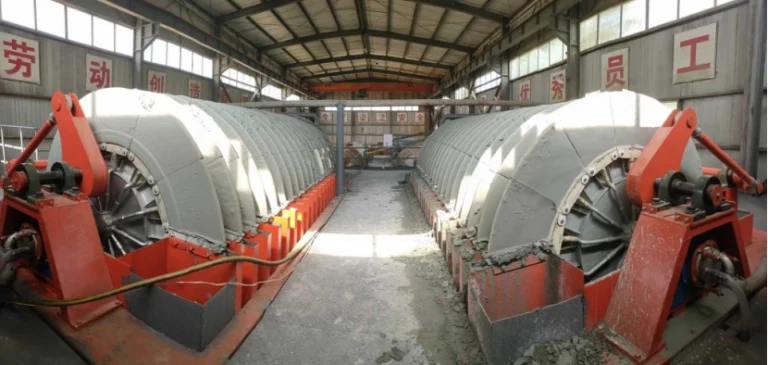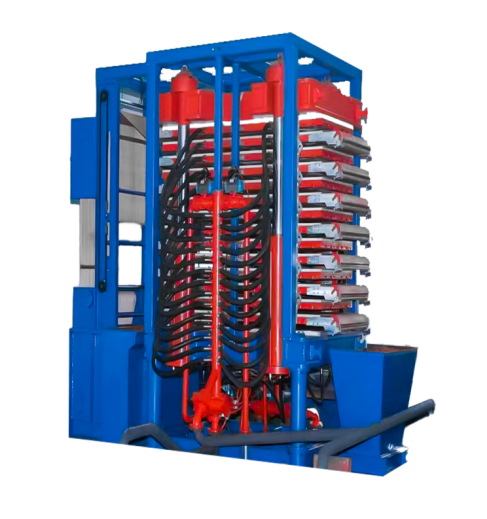
Understanding Vertical Press Filters
What Are Vertical Press Filters?
Vertical press filters excel in separating solids from liquids. They use pressure differences across filter cloths. Pumps, gravity, or external forces drive this. Air or water pressure often helps. These systems save energy. They perform well. The TFP vertical filter press stands out. It’s fully automated. It separates solids and liquids efficiently. It consumes little energy.
Key Components
Vertical press filters have vital parts:
Filter Plates: Stacked like a tower. They save space. They boost filtration.
Filter Cloth: Traps solids. It lets liquids pass.
Hydraulic System: Opens and closes plates precisely.
Diaphragm or Membrane: Squeezes filter cake. It removes more liquid.
Control System: PLC-based. It automates tasks. It simplifies use.
The machine runs on hydraulics. It’s stable and safe. A PLC and touch panel control it. Auto valves make it easy. It’s highly automated.
How They Work
Slurry enters the chamber. The filter plate frame closes first. Liquid flows through the cloth. It reaches a liquid chamber. Soft tubes discharge it. High-pressure water or air presses the diaphragm. This squeezes extra liquid from the cake. Optional washing cleans the cake. Fluids remove impurities. Compressed air dries the cake. It reaches ideal moisture levels. Sticky materials process well. The final drying uses air.
Advantages of Using Vertical Press Filters
Durability and Longevity
Vertical press filters are tough. They use strong materials. Advanced designs ensure reliability. They meet strict standards. Country, industry, and company rules guide production. Quality parts reduce wear. The machines handle tough conditions. They last for years.
High Filtration Performance
These filters excel at their job. They manage high pressures. Up to 20 MPa is possible. They process sticky or fine materials. They achieve low moisture in filter cakes. Automation boosts output. It cuts manual work. The system shines in tough scenarios.
Cost Savings Over Time
The initial cost is high. But savings add up. The filters are durable. They need less upkeep. They process materials fast. Their efficiency is far greater than traditional presses. Some are ten times better. This lowers running costs. It benefits the bottom line.
Applications of Vertical Press Filters Across Industries
Chemical Industry Uses
Vertical press filters are key in chemical plants. They separate solids from liquids precisely. They treat leaching residues. They handle electrolytic waste. The filters ensure clean processes. They maintain product quality.
They dewater oxides effectively. Smelting and chemical sectors rely on them.
Mining and Mineral Processing
Mining benefits greatly. These filters dewater tailings. They concentrate ores. They manage by-products. They handle large volumes. This suits big mineral plants. Pressure differences across filter cloths ensure top separation.
Food and Beverage Role
Food plants use these filters. They clarify liquids like juices. Syrups are processed too. Unwanted particles are removed. Quality stays high. The process is efficient.
Yantai Hexin Environmental Protection Equipment Co.,Ltd offers tailored solutions. Their filters meet industry needs.
Factors to Consider When Choosing a Vertical Press Filter
Material Compatibility
Materials must match filter parts. Chemical reactions can harm equipment. Temperature changes pose risks. Abrasive materials wear components. High-quality plates and cloths are vital. They resist damage. They ensure longevity. The equipment follows strict standards. Country, industry, and company rules apply. This guarantees reliability. It handles tough tasks.
Capacity and Throughput
Know your needs. Volume of slurry matters. Filtration speed is key. Vertical press filters come in many sizes. They fit different goals. Their efficiency beats traditional presses. Some are ten times faster. This suits high-output settings. Choose a model that aligns with production.
Maintenance and Efficiency
Upkeep affects costs. Automated filters simplify work. PLC controls reduce manual tasks. The machine runs on hydraulics. It’s stable and safe. A touch panel and auto valves ease operation. It’s highly automated. Self-cleaning cloths save time. They cut downtime. This boosts efficiency.
Environmental Impact of Vertical Press Filters
Waste Reduction
These filters cut waste. They dewater thoroughly. This shrinks waste volume. Disposal becomes easier. It’s kinder to the environment. Efficient separation saves resources. Valuable materials aren’t lost. Industries benefit.
Energy Savings
Energy use is low. Advanced designs optimize pressure. Filtration cycles are streamlined. The TFP vertical filter press is automated. It separates solids and liquids well. It consumes less power. This reduces carbon footprints. It’s a green choice.
Supporting Green Practices
Vertical press filters aid sustainability. They recycle filtrates. They cut resource use. Industries like mining benefit. Chemical and wastewater sectors do too. They dewater oxides in smelting. They promote conservation. They align with eco-goals.
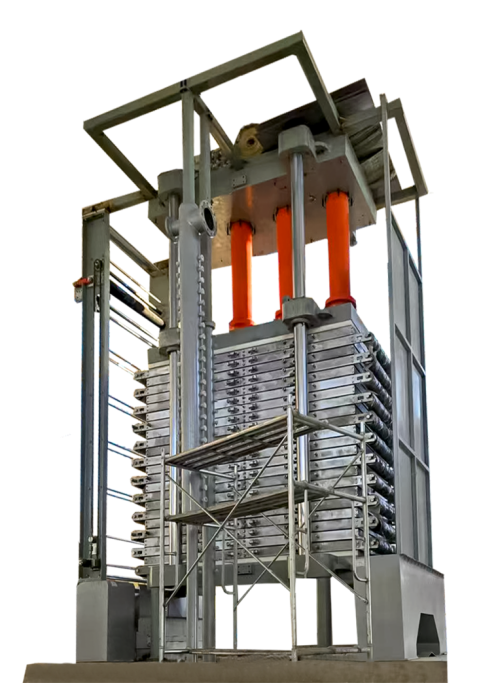
Frequently Asked Questions
What factors guide filter selection?
Consider material compatibility. Check capacity needs. Assess maintenance. Look at efficiency.
How do filters help the environment?
They reduce waste. They dewater effectively. They support recycling in industries.
Are these filters energy-efficient?
Yes, they use less power. They outperform traditional methods. They save energy.
Which industries use them most?
Mining, chemicals, food, and wastewater treatment benefit. They excel at solid-liquid separation.
Contact Yantai Hexin Environmental Protection Equipment Co.,Ltd in YEDA, Yantai City, Shandong Province. They’ve specialized in filtration for over 20 years. Their R&D and sales expertise delivers quality!

